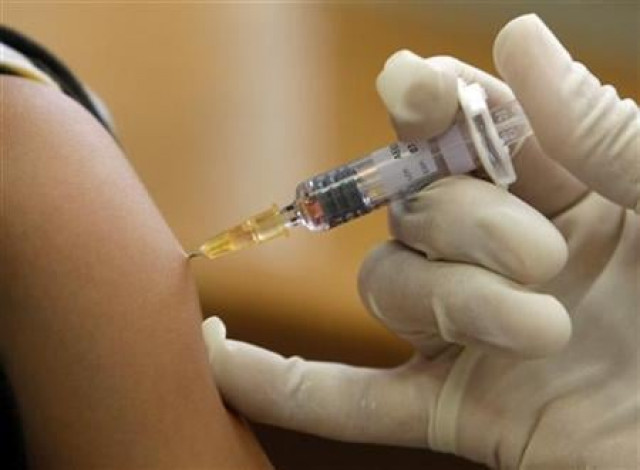Cultural barriers hamper immunisation
Health experts urge parents to inoculate their children to guard against preventable diseases

Prod Dr Asghar said without vaccines, epidemics of many preventable diseases could return, resulting in increased – and unnecessary – illness, disability, and death. PHOTO: REUTERS
This was stated by different paediatricians while speaking at a briefing to mark World Immunisation Week [April 24-30].
‘Incorporating technology in health care sector can save lives’
Professor Dr Samiya Naeemullah, head of the Paediatrics Department at the Islamic International Medical College, said that measles vaccination had resulted in a 75 per cent drop in deaths worldwide caused by the disease between 2000 and 2013. Moreover, Prof Dr Naeemullah said that illnesses and complications caused by influenza can be reduced by up to 60 per cent, and deaths by 80 per cent, in elderly patients through inoculation.

“Polio cases have been reduced by 99 per cent from over 300,000 per year in 1988 to less than 650 cases in 2011. Smallpox was eradicated globally within 10 years,” Prof Dr Naeemullah added.
She further said that there was a need to educate parents about the importance of vaccination. “Media is the only forum which can create mass awareness and help protect our children from deadly diseases.”
Int’l conference: Experts call for focusing on health psychology
The health experts said that Pakistan has the highest infant mortality rate [IMR] in South Asia with low immunisation and vaccination coverage the biggest contributor towards that. With mere 56 per cent coverage, almost half of all children in Pakistan were not immunised.
Pakistan Paediatric Association President [PPA] and head of Paediatrics Department at the Allied Hospital and RMC Professor Dr Rai Asghar said that immunisation is a proven tool for controlling and eliminating life-threatening infectious diseases and there was a dire need to increase its reach.
He said that with the inclusion of Rotavirus diarrhoea in EPI, the government was offering protection against 10 deadly diseases. “Increasing coverage to 80 per cent can reduce infant child mortality drastically,” said Prof Dr Asghar.
Hospital staff strike for health allowance continues
“Vaccines protect children by preparing their bodies to fight many potentially deadly diseases. They are responsible for controlling many infectious diseases which were once common around the world, including smallpox, polio, measles, diphtheria, pertussis [whooping cough], rubella [German measles], mumps, tetanus, and Haemophilus influenza type b [Hib].”
“Without vaccines, epidemics of many preventable diseases could return, resulting in increased – and unnecessary – illness, disability, and death,” he said while responding to a question on the importance of immunisation.
Published in The Express Tribune, April 30th, 2017.



















COMMENTS
Comments are moderated and generally will be posted if they are on-topic and not abusive.
For more information, please see our Comments FAQ